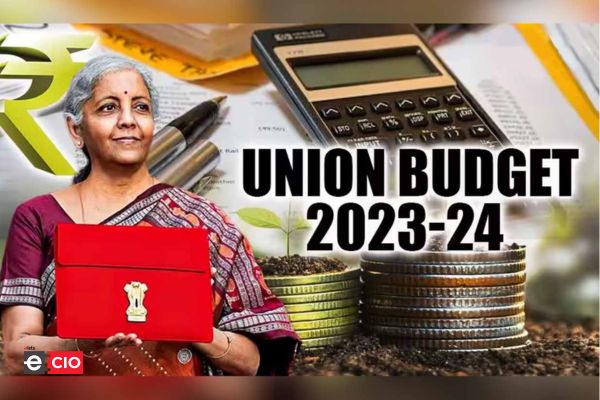
As India prepares for the upcoming elections, Union Finance Minister Nirmala Sitharaman is set to unveil the Union Budget 2024-25. This budget is especially significant for the enterprise and technology sectors, poised at the forefront of India’s economic growth. There is a keen anticipation for initiatives that could stimulate these sectors, focusing on the integration of cutting-edge technologies, attracting foreign investments, and bolstering digital skills. Additionally, the creation of job opportunities and industry-specific insights are highly awaited. These measures are vital for enhancing India’s business ecosystem, offering a glimpse into the strategic direction the budget is expected to take.
To embark on a detailed journey, let’s delve into an in-depth exploration of various key sectors and uncover what industry leaders are anticipating, shedding light on their expectations and perspectives. These sectors, ranging from technology and startups to health-tech and AI, form the backbone of India’s ambitious economic roadmap.

IT Sector
The Indian IT sector, a key driver of the nation’s GDP, has seen remarkable growth with revenues reaching $194 billion in 2022, largely due to government initiatives like ‘Digital India‘. This growth is expected to continue, with the digital economy projected to form a significant part of India’s GDP by 2025. The sector anticipates enhanced support in R&D, particularly in emerging technologies such as AI and IoT, alongside bolstered efforts in cybersecurity and digital skills development. This focus is set to solidify India’s position as a global technology leader, leveraging a blend of innovation, skilled workforce, and a secure digital infrastructure.

Industry Speaks

 Alok Dubey, Chief Finance Officer, Acer India
Alok Dubey, Chief Finance Officer, Acer India
“The upcoming Union Budget 2024 has the potential to shape the IT Tech sector in the next fiscal year. As we anticipate Budget 2024, our expectations revolve around fostering India’s tech innovation ecosystem. We look forward to heightened investments in Research and development and Artificial Intelligence, underlining a strategic roadmap emphasizing innovation, sustainability, and accessibility within the industry. Aligned with the Make in India initiative, we expect that the Production Linked Incentive (PLI) program, designed to support IT hardware and computer server manufacturers, along with the government’s resolute commitment to digital skill development, will be accorded significant priority. We anticipate a budget that not only aligns with but elevates the Make in India objectives, providing a robust framework for the growth and alignment of the IT Tech sector.”
 Archana Srinivasan, Chief Financial Officer, iOPEX Technologies
Archana Srinivasan, Chief Financial Officer, iOPEX Technologies
“We are not expecting major changes as it is most likely to be a vote on account. Inflation-targeted rate mechanisms should continue with liquidity for necessary events. Focusing on digitization is the need of the hour in the IT industry. We are witnessing a runaway increase in labor costs, and this affects the IT industry. Keeping the interest intact among smaller companies, the government should come up with specific schemes related to the IT sector. This is similar to measures like the PLI scheme for the manufacturing sector.”
 Piyush Goel, Founder and CEO, Beyond Key
Piyush Goel, Founder and CEO, Beyond Key
“With Indian companies seeking to gain a competitive advantage in the international market, the reduction of the current corporate tax rate is a key enabler for realizing significant gains. This tax cut does more for us than simply free up the budget for research and development; it additionally makes us stronger competitors in worldwide markets. To propel Indian businesses to the leading edge of technological advancements, prioritising investments in artificial intelligence, innovation, and research and development is crucial. This move will not only help Indian organisations emerge victorious globally, but it also creates the inspiration for future economic growth in the virtual age, in which a commitment to modern technologies is in all likelihood to propel us into a period of consistent growth and global prominence.”
 Alok Kashyap, Founder and CEO, Yatiken Software Solutions
Alok Kashyap, Founder and CEO, Yatiken Software Solutions
“At Yatiken Software Solutions, our expectations for Union Budget 2024 align with key areas crucial for the IT sector’s growth. We look forward to potential allocations for EV infrastructure development, presenting exciting opportunities in software for EV systems, IoT integration for smart charging, and data analytics for EV performance optimization. Additionally, we hope for a significant GST relaxation for the service sector, leading to a reduction in the 18% GST rate. This move would alleviate operational costs for IT firms, enhancing global competitiveness and providing resources for further innovation and talent development. Besides that, initiatives for upskilling programs in emerging technologies such as AI, blockchain, and cybersecurity are critical for the continuous growth of the tech industry. Collaborative efforts between educational institutions and industry partnerships can ensure a skilled workforce. Likewise, the establishment of tech-focused Special Economic Zones (SEZs) holds promise, offering tax benefits and infrastructure support to attract foreign investments and foster innovation in the IT sector. Moreover, investments in internet adoption and 5G deployment, especially in healthcare, could create opportunities for developing applications in telemedicine, remote monitoring, and data-driven healthcare solutions. These expectations, if addressed in the Union Budget, have the potential to remarkably shape the trajectory of the IT sector by fostering innovation, supporting infrastructure development, and enhancing skills in emerging technologies.”
Automobile Industry
The push towards sustainable solutions in the previous budget ushered in a new era for the automobile industry, particularly in electric vehicles (EVs). The EV market, expected to surge to $7 billion by 2025, looks forward to continued governmental support, potentially through further incentives for EV production and infrastructure development. There’s also a keen interest in the advancement of hybrid vehicles and automotive technology.
Industry Speaks
 Varun Goenka, CEO & Co- Founder, Chargeup
Varun Goenka, CEO & Co- Founder, Chargeup
“The Government of India’s proposed FAME-III plan has indicated that there is continued focus on the development and faster adoption of EVs in India, and that’s encouraging for all ecosystem stakeholders including Chargeup. However, this is also a time when we need to look beyond subsidies for the purchase of electric 2 and 3-wheelers and address other financial concerns that could make a bigger and more positive impact on the market compared to the subsidies. FAME-I and FAME-II did a lot of good to these segments, as the demand was catalyzed and several new EV OEMs came into the market. However, today, there is not much of a difference between the cost of electric and conventional 2 and 3-wheelers. With greater demand, the gap will further close in 2024 and beyond. However, issues like high GST rates, and lack of affordable financing for building EV infrastructure such as Battery-as-a-Service facilities, charging stations, and undertaking R&D is a bigger concern. We expect the Government to reduce GST applicability on EV products and services, and to include the EV as well as battery development, charging networks, and allied services in the priority sector lending list. This would open the doors for investments in the ecosystem, and accelerate India’s EV adoption. Further, the impact of FAME-III subsidies can be enhanced if EV buyers who choose to buy a vehicle without a battery are also covered under it. If the allocation for electric 2- and 3-wheeler subsidies is reduced, and funds are deployed towards other areas of ecosystem building, that would also make a positive impact. We are hopeful that through the upcoming Interim Budget, and the full Union Budget later in the year, the Government of India will address these needs.”
 Sameer Aggarwal, CEO and Founder at Revfin
Sameer Aggarwal, CEO and Founder at Revfin
“As we anticipate Budget 2024, India’s electric vehicle (EV) sector beckons a strategic shift towards holistic growth aligned with the net-zero aspirations of Bharat. Beyond the $2.6 billion 2023 funding boost and the pivotal role of subsidies, the focus now extends to making EV lending a linchpin in our financial landscape. Budget 2024 must prioritize streamlined regulatory processes, ensuring seamless, affordable access to finance, thereby catalyzing industry growth and contributing to our net-zero goals. The ‘Make in India’ initiative should further be underscored, emphasizing an ecosystem where quality, innovation, and cost-effectiveness prevail. Comprehensive policies are imperative, intensifying R&D investments, expanding charging infrastructure, and nurturing indigenous battery manufacturing. Recognizing the pivotal role of auxiliary sectors like charging solutions and battery technology, collaborative initiatives involving government, industry, and FinTech entities are crucial for affordability, innovation, and establishing India as a global hub for sustainable mobility. In Budget 2024, intertwining financial support with regulatory facilitation presents a unique opportunity to propel India towards a greener, sustainable future, fostering economic growth and technological advancement in the EV sector.”
 Chandresh Sethia, Co-founder, EVRE
Chandresh Sethia, Co-founder, EVRE
“One of the foremost things that the industry is looking forward to is the reduction in the current GST rate of 18% for charging infrastructure. Aligning this tax rate with the taxation on electricity sales would not only improve the accessibility of electric vehicle charging but also foster the widespread adoption of sustainable transportation solutions. Additionally, we urge the Government to offer tax rebates to encourage investments in research and development for charger hardware and large-scale charging infrastructure technologies”
 Bharath Rao, Co-Founder / CEO, Emobi
Bharath Rao, Co-Founder / CEO, Emobi
“One of the foremost things that the industry is keenly expecting is the changes in the FAME 2 subsidies in the Union Budget 2024. This is one of the most significant aspects and the entire ecosystem is waiting to understand how the subsidy terms will be tweaked and extended. A significant trend that I foresee will bring a new twist to the market is the rise of battery-swapping companies. Another aspect I urge the Government to consider is the difference in GST rates. Currently. EVs sold with included batteries have a 5% GST, while those sold without, especially for battery-swapping, face an 18% GST. Additionally, purchasing lithium batteries separately incurs an 18% GST, compared to the 5% GST when included in the EV purchase. This makes it difficult for companies investing in battery-swapping technology. The industry is looking forward to a budget that levels the playing field, encourages new ideas, and pushes the EV industry toward a sustainable and balanced future.”
Start-Ups
The Indian government proposed significant changes to benefit startups, notably extending the period for eligible startups to carry forward and set off losses incurred in their first 10 years of operation. This amendment to Section 79 of the Income Tax Act, 1961, was a crucial support measure, allowing startups more time to recover and utilize their losses, thereby reducing taxable income and improving their financial stability. As for the expectations from the upcoming 2024 budget, startups are looking forward to further supportive measures, although specific details or proposals are not yet clear. The 2023 amendment has set a positive precedent, indicating the government’s commitment to fostering a robust startup ecosystem in India.
Industry Speaks
 Akshay Munjal, Founder and CEO, Hero Vired
Akshay Munjal, Founder and CEO, Hero Vired
“The inclusion of new funding initiatives and schemes in the upcoming interim budget could help eliminate the roadblocks hindering the startup sector. It would also assist in the adoption of new-age emerging technologies, while simultaneously allocating increased expenses for a robust digital infrastructure. The budget is anticipated to empower the workforce of the future, with a focus on enhancing the overall regulatory structure to accelerate the growth momentum and promote India’s startup ecosystem.”
 Amar Nagaram, Co-Founder, Virgio
Amar Nagaram, Co-Founder, Virgio
“FM Sitharaman extended the period of incorporation for income tax benefits to eligible start-ups till March 31, 2024, in the Union budget of 2023-24. She also announced the benefit of carrying forward losses from 7 years to 10 years. These initiatives have helped start-ups thrive in a competitive market. Union Budget 2023 heralds a green dawn for India, resonating with a pledge for sustainability. This fiscal roadmap reflects a commitment to fostering a harmonious coexistence between economic growth and ecological well-being. Echoing this, brands like Virgio are embracing circularity and envisioning a future where India leads the charge in building a greener, more resilient world, reaffirming the nation’s role as a responsible global brand. This year, we expect a budget that has transformative initiatives, signalling a decisive step towards a resilient and eco-conscious future. With strategic allocations and forward-thinking policies, it charts a course for sustainable development, acknowledging the imperative to balance progress with environmental protection and empowering brands to be more sustainable in the industry they operate.”
 Sahil Jain, Co-Founder, Techno Companion
Sahil Jain, Co-Founder, Techno Companion
“In the realm of startups, the anticipation preceding the budget is akin to a pivotal chapter in the entrepreneurial journey. The pre-budget expectations of startups are not merely fiscal aspirations; they embody the collective hopes of innovators and visionaries seeking a conducive ecosystem. Startups yearn for tax reforms, simplified regulatory frameworks, and increased access to funding, laying the groundwork for sustained growth and innovation. The budget becomes a compass guiding the entrepreneurial spirit towards a landscape of opportunities, fostering an environment where risk-taking is encouraged, and creativity flourishes. As we await the fiscal blueprint, the startup community envisions a budget that not only acknowledges their challenges but propels them towards a future where audacious dreams are nurtured and realized.”
Financial Technology (Fintech)
The fintech sector was notably empowered by previous policies promoting digital transactions and the establishment of fintech hubs. This led to a dramatic increase in UPI transactions, showcasing the sector’s vitality. Anticipated to be valued at $150 billion by 2025, the fintech industry eyes the upcoming budget as a critical moment for further regulatory relaxation, increased investment in digital payment infrastructures, and initiatives promoting financial literacy and inclusion.
Industry Speaks:
 Anuj Arora, Co-Founder & COO, SahiBandhu Gold Loans
Anuj Arora, Co-Founder & COO, SahiBandhu Gold Loans
“We anticipate the Interim Budget 2024 to align with the government’s mission of uplifting the underprivileged and urge the government to introduce beneficiary schemes, especially as the General Sabha election approaches, focusing on the socio-economic empowerment of the marginalized. Acknowledging the FinTech and tech-based gold loan industry’s pivotal role in reshaping financial services, we hope for policies supporting our growth, particularly in Tier 2, 3, and 4 cities, aiming to integrate rural communities into the formal banking system. Incentivizing FinTech dedicated to empowering SMEs through financial and technical interventions would mark a significant stride. Addressing loan disbursement including loans against gold/jewellery, we recommend regulations fostering collaboration between traditional banks and digital lenders for accessible loans. With the budget on the horizon, SahiBandhu Gold Loans, the largest gold loan aggregator platform eagerly anticipates a budget that propels innovation and inclusion in the rapidly evolving FinTech and gold-tech landscape.”
 Sarvjeet Virk, Co-founder & MD, Finvasia
Sarvjeet Virk, Co-founder & MD, Finvasia
“As we approach Budget 2024, we anticipate a continued focus on advancing India’s digital public infrastructure, a key pillar for realizing the $5 trillion economy dream. I look forward to enhanced government initiatives fostering financial inclusion benefiting Bharat, not just India. On the tech front, I hope to see further progress in establishing AI Centres of Excellence. I also expect more policies to enable public-private partnership to boost end-use-cases of generative and predictive AI and increase its adoption in India. The fintech industry, as usual, will be the flag bearer of innovation. Government support, both in terms of policies and funding, will be instrumental in propelling the fintech sector to new heights of success.”
 V. Balasubramanian, CEO, FSS Cash Tech
V. Balasubramanian, CEO, FSS Cash Tech
“Given that this will be an interim Budget, I expect the Honorable Finance Minister Nirmala Sitharaman to showcase the government’s vision leading up to the upcoming Lok Sabha elections. This government has always focused on making India digitally progressive, which is one of the reasons why we have seen digital payments grow exponentially over the last few years. We’re now at a stage where customers expect digital payments to be fast, secure, and smooth. In this light, financial institutions and companies will have to use new-age technologies to meet customer expectations. Cloud technology will play a big role here. RBI’s proposal to establish a cloud facility for the financial sector was a major move in this direction. I hope the FM furthers this in the Budget, and we would like to see dedicated policies on cloud technology for payment. With the recent milestone achievement by the Reserve Bank of India (RBI) of digital rupee surpassing 1 million daily transactions (as on December 27, 2023), CBDC should be included as a part of financial inclusion in the budget this year. The government should also focus on expanding the reach of digital payments to the smaller cities and towns in India. What is now becoming the norm in urban India needs to be adopted across the country as well to take Digital India to the next level.”
 George Alexander Muthoot, MD, Muthoot Finance
George Alexander Muthoot, MD, Muthoot Finance
“Indian households possess up to 25,000 tonnes of gold which lies idle and can be leveraged as an immediate and reliable source of financing to meet immediate personal or business needs. Granting ‘priority sector status’ to gold loans and allowing a ‘Gold linked credit line via UPI’ can go a long way to help households/small business owners meet their financing needs and monetise idle gold jewellery.bWe believe giving priority sector status to eligible gold loans will benefit the bottom of the pyramid and enhance financial inclusion. Typically small borrowers need loans under Rs 50,000 (about 20 grams of gold collateral) for short durations like a year. Herein gold loan NBFCs can play an important role to fulfill the needs of small borrowers, self-employed, micro business owners, and help address their finance needs or working capital needs. Gold loans against jewellery also is a vital funding source for MSMEs. Gold loans provided by banks to farmers do get priority sector status, but not gold loans provided by NBFCs. Extending priority status to all micro gold loans (under Rs. 50,000) by removing the current distinction between NBFCs and banks can enable gold loan NBFCs access to increased funding.”
Atul Garg, Founder, FinEzzy
“The Union Budget of India is a crucial event for fintechs, particularly digital lending platforms that offer credit against financial assets for lending institutions. A key expectation from the budget is a strategic focus on enhancing the loan-to-value (LTV) ratios on deserving schemes. Traditionally, LTV ratios have been static, but there is a growing demand for more dynamic and flexible LTV frameworks. This change could enable lending platforms to offer more tailored financial solutions to their customers, particularly in scenarios where the value of pledged assets fluctuates. Another significant expectation is the inclusion of fintechs in the consent-based data sharing ecosystem, such as the Account Aggregator (AA) framework, even though they are not directly regulated by IRDAI, RBI, or SEBI. This inclusion would allow fintechs to access a wider pool of financial data, subject to customer consent, which can be instrumental in improving credit assessment, risk management, and customer service. The integration into the AA ecosystem would mean fintechs can leverage data more efficiently, leading to better financial products and services for consumers.”
E-commerce
Thriving from the digital boost and the liberalisation of FDI policies in the previous budget, the e-commerce sector is expected to reach a market value of $200 billion by 2026. As the sector grows rapidly, industry players await policies in the upcoming budget that could streamline online retail operations, focusing on areas like cross-border trade, taxation, and data localisation.
Industry Speaks:
Jayant Jain, CEO & GM, Modular
“As we approach the announcement of the Fiscal Budget 2024-25, we expect that the government will further prioritise infrastructure development and promote measures that boost regional manufacturing under the made-in-Indian theme. Furthermore, we anticipate efforts to promote digitalisation for inclusive growth. Our expectations from the forthcoming budget 2024-25 revolve around creating advancement in the technological landscape and stimulating innovation in the electrical industry. This will provide opportunities for companies like us to extend our product offerings and enter new segments and geographies. We also hope to see more incentives for R&D in the sector, as well as initiatives to address any industry-specific difficulties, such as supply chain interruptions or rising raw material costs. In general, we believe that a budget focused on these areas will benefit not only the electrical industry but will also contribute to the country’s general economic growth.”
Healthtech
The healthtech sector, indirectly supported by increased healthcare spending in the last budget, has been pivotal in transforming healthcare delivery in India. The rise of telemedicine and e-pharmacies, making healthcare more accessible, is just one facet of this transformation. The digital healthcare market is projected to reach $16 billion by 2025, driven by innovations in AI and machine learning in diagnostics. The 2024 budget is expected to allocate specific funds for healthtech initiatives, potentially focusing on telehealth services, AI in diagnostics, and digital health record management.
Industry Speaks:
 Namit Chugh, Principal, W Health Ventures
Namit Chugh, Principal, W Health Ventures
“The previous budget marked significant advancements in India’s healthcare sector, particularly in digital health initiatives. Looking ahead, we anticipate the continuation of this positive trajectory in the Union Budget 2024. There was a push towards enhancing mental health and AIDS-related investments last year and we expect the focus this year will be on new single specialties such as cancer. India’s cancer burden is growing ~10% YoY, and expected to reach ~10M cases by 2027. Lack of access to early cancer detection and treatment is driving up mortality rates as almost 60-70% of cancers are detected in Stages 3 and 4. A strong cancer detection program and a focus on expanding the oncology infrastructure will be positive step in this direction. Further as India strides into a transformative phase in tech-driven healthcare, we expect government support in promoting innovation and establishing effective policies to drive the smooth incorporation of AI in the healthcare sector. Such commitments have the potential not only to enhance medical services in the country but also to position the nation as a hub for health-tech innovation. We also hope that the government’s manufacturing focus is extended to medical devices by offering more incentives and programs for supporting local medical devices production and export.”
 Chandra Ganjoo, Group Chief Executive Officer, Trivitron Healthcare
Chandra Ganjoo, Group Chief Executive Officer, Trivitron Healthcare
“As we approach the Union Budget 2024-25, the MedTech industry in India holds high expectations. With an alarming 80-85% dependence on imports, resulting in a massive import bill of over ₹ 63,200 crore, it’s crucial for the government to catalyze domestic manufacturing. This not only reduces the financial strain but also propels India towards self-reliance in medical technology. The industry advocates for a comprehensive strategy: incentivizing R&D and indigenous production, streamlining regulatory processes for faster product approvals, and enhancing infrastructure and skills. Tax incentives for investment in advanced technology, streamlining bureaucratic procedures, and fostering industry-academia collaboration can stimulate domestic manufacturing. This approach should align with global standards and ensure a stable regulatory environment to attract investments. The pre-budget expectations for the MedTech industry hinge on a balanced approach that nurtures innovation, reduces import dependency, and maintains healthcare affordability, all while fostering a globally competitive and resilient healthcare ecosystem in India.”
 Saurav Kasera, Co-Founder, Clirnet
Saurav Kasera, Co-Founder, Clirnet
“The Union Budget holds the potential to revolutionize healthcare accessibility in India’s remote areas. Ongoing training and upgradation for all healthcare professionals are vital to a patient-centric system. A blend of incentives to make healthcare training more affordable and accessible can hold the key. These could include bringing healthcare education under a special GST category with lower or nil rates (currently no set off available as medical services carry Nil GST), offering deductions in direct taxes for healthcare training expenses, and providing financial benefits/grants to institutions offering such training. Moreover, enhancing budget allocations for digital health infrastructure and telemedicine will ensure that quality healthcare reaches every corner of the country. Together, these initiatives promise to build a more robust, inclusive, and skilled healthcare workforce in India, ultimately leading to improved patient care and health outcomes across the nation.”
Educational Technology (Edtech)
The edtech sector experienced significant growth following the last budget’s increased focus on education and digital initiatives, leading to a marked shift towards online learning platforms. The Indian edtech market is set to grow to $10.4 billion by 2025, reflecting the rapid adoption of digital learning tools. The upcoming budget is expected to further support this sector, with hopes for enhanced digital infrastructure in education and incentives for the development of innovative educational content and technology.
Industry Speaks:
Akshay Munjal, Founder and CEO, Hero Vired
“Anticipating the Interim Budget 2024, our expectations center around fostering the growth of startups and establishing a robust policy framework for an enduring ecosystem. To promote research and development in the education sector, we call for a review of the 18% GST on education services, aiming to alleviate financial burdens. In this budget, emphasis must be placed on skill development, accompanied by a crucial need for the recognition of online degrees, which enhances the credibility and overall operations of EdTech firms. Additionally, we anticipate comprehensive support through priority-sector lending, facilitating all-encompassing expansion for both conventional and modern education. To forge a digitally proficient and futuristic educational system, the acceleration of technological adoption to boost the skilling industry is paramount. Smooth access to funds becomes equally critical in this pursuit. The budget’s potential to invigorate the EdTech sector lies in expediting innovation, improving accessibility, and fostering inclusivity through policies that create a harmonious environment for sustained progress.”
 Prateek Maheshwari Co-Chair India Edtech Consortium (IEC), Co Founder- Physics Wallah (PW)
Prateek Maheshwari Co-Chair India Edtech Consortium (IEC), Co Founder- Physics Wallah (PW)
“In view of the upcoming interim Union Budget, we would like to appeal to the government to increase the education sector’s budget, and reduce the GST slab from 18% to 5% on educational products and services. Our aim is to establish a strong foundation for the country’s children, particularly those from economically disadvantaged backgrounds. Additionally, given the evolving world and our shifting approach to education, driving a change to ensure affordable and quality education at scale needs more collaboration for public and private sectors. For this, reducing the GST on educational services would also remove financial strain on parents, promoting affordability. Apart from this, focusing on collectively enhancing youth skills to increase employability and reduce skilling gaps is imperative for the Indian economy’s growth.”
Micro, Small and Medium Enterprises (MSMEs)
MSMEs, contributing significantly to India’s GDP, received considerable attention in the last budget through enhanced credit facilities, tax reliefs, and support measures. These initiatives were crucial in sustaining and reviving MSMEs. Looking ahead, the sector hopes for more robust support from the government, including easier access to funding, policy reforms, and further simplification of GST regulations.
Industry Speaks:
 Bharath Anantha Srinivas, the CEO of Technovos Machinery PrivateLimited
Bharath Anantha Srinivas, the CEO of Technovos Machinery PrivateLimited
“As the budget approaches, a sustainable mobility solutions visionary emphasizes the critical role SMEs play in innovation and economic growth. Expecting continued government support for Make in India, the expert envisions policies fostering entrepreneurship and easing regulatory processes for small businesses. Advocating for incentives in sustainable practices and especially in Cleantech and Agritech, the outlook is optimistic. The hope is for a budget empowering SMEs to thrive, contribute to job creation, and shape a resilient, sustainable future.”
 Kapil Bansal, Partner, Energy Transition & Decarbonization, EY India
Kapil Bansal, Partner, Energy Transition & Decarbonization, EY India
“As India moves towards a greener future, Budget 2024 is set to be more than just a financial blueprint; it will crucially influence India’s position in the global clean energy landscape. The government’s fiscal choices and strategic investments will impact both domestic energy transitions and wider global sustainability efforts. In essence, Budget 2024 can be a testament to India’s commitment to sustainability, acting as a strategic roadmap driving us towards a future marked by innovation and resilience. As these initiatives bear fruit, India’s place in the global clean energy stage will be solidified, paving the way for sustainable growth and development.”
 Ketul Acharya, President, Global Alliance for Mass Entrepreneurship
Ketul Acharya, President, Global Alliance for Mass Entrepreneurship
“India’s MSME sector is proving to be pivotal to our country’s economic growth. Driven by technology adoption at scale, MSMEs show great potential in transforming India’s economy into one of mass entrepreneurship and job creation. In the upcoming Union Budget 2024, we hope to see nuanced policy frameworks with strategic tax benefits and infrastructure development that will play a vital role in fostering a positive growth environment for MSMEs. Easier access to credit and finance remains imperative for MSMEs and strengthening the policy around this will be very impactful. We look forward to considerations such as soft loans at minimal interest rates, specifically tailored to alleviate the challenges MSMEs face during economic slowdowns. A holistic and forward-looking budget that addresses these key areas will continue to fuel the growth trajectory of the country’s MSME sector and contribute significantly to the nation’s economic resilience.”
Artificial Intelligence (AI)
India’s commitment to AI, projected to grow substantially, reflects its ambition to lead in this field. India’s AI market is expected to reach USD 7.8 billion by 2025. While the last budget indirectly supported AI development across various sectors, the upcoming budget is likely to include specific policies and funds for AI research and development, highlighting its application in sectors like healthcare, education, and agriculture.
Industry Speaks:
 Krish Ramineni, CEO at Fireflies.ai
Krish Ramineni, CEO at Fireflies.ai
“As we eagerly await the Union Budget 2024, my expectations for the startup ecosystem revolve around fostering innovation and harnessing the potential of Artificial Intelligence (AI). The Indian startup landscape stands at a crucial juncture, primed to leverage the transformative power of AI in shaping the future of technology and services. In the next five years, AI-driven advancements promise to revolutionize industries, and it is imperative that the budget reflects a commitment to incentivizing and supporting startups at the forefront of this wave. By encouraging Research and Development (R&D) investments, we can catalyze a surge in entrepreneurial activity, laying the foundation for groundbreaking solutions that will redefine global standards. This is an opportune moment for India’s tech ecosystem to shine on the international stage, capitalizing on the momentum generated by influential players like OpenAI and Microsoft. I look forward to a budget that propels our startup community into a future where AI-driven innovation is not just encouraged but integral to our nation’s growth story.”
 Amit Mishra, CEO & Founder, iMocha
Amit Mishra, CEO & Founder, iMocha
“India is facing two big challenges right now. First, they need to find jobs for the huge number of young people who are looking for work every year. Second, they need to make sure that people who already have jobs, especially in technology, stay skilled and prepared for the future. To solve these problems, they should focus on hiring people for their skills, not just their degrees or past job titles. Also, the whole country should work together to improve the skills of its workers. The government should spend money on training people in things like artificial intelligence (AI), machine learning (ML), and cybersecurity. Since there’s a big need for skilled people in these areas, government funding for training will help young people get better jobs. The government and private companies should work together to train lots of people in skills for the future, like coding, AI, robotics, and other tech skills. In the last budget, the government focused on education that includes working while learning. This year, they are expected to focus even more on this.”
 Abhinav Jain, CEO & Co-Founder, Almonds Ai
Abhinav Jain, CEO & Co-Founder, Almonds Ai
“The upcoming 2024 Indian budget are focused on fostering a conducive environment for technology and innovation, particularly in the AI and customer engagement sectors. I anticipate supportive policies and investments that will further fuel the growth of AI-driven technologies. This includes tax incentives for R&D in AI, enhanced data protection laws that encourage innovation while ensuring privacy, and increased government spending on digital infrastructure, which is crucial for tech companies like ours. The budget could significantly influence technology and innovation in our field by creating a more robust digital ecosystem. Improved internet connectivity and digital literacy can expand our market reach. Furthermore, favorable policies around data usage and AI can accelerate innovation, helping companies like Almonds Ai to develop more advanced, secure, and user-friendly customer engagement solutions. In essence, a supportive budget can be a catalyst for technological advancements, driving India’s position as a global hub for AI and digital innovation.”
 Amit Relan, Co-Founder and CEO, mFilterIt
Amit Relan, Co-Founder and CEO, mFilterIt
“Last year’s Union Budget had a significant mention of the advancements in technology and fostering the digital economy. For the upcoming budget announcement, we are expecting a significant share of focus on critical issues concerning data protection, cybersecurity, and digital infrastructure. With the introduction of the data protection bill, we are expecting to see stride movements in the regulation of data privacy aligning with global standards, a cohesive policy framework to protect user privacy and also stimulate innovation in the digital economy. Alongside privacy and protection, we expect to see some wave movement around emerging technologies like AI and the nation’s take on leveraging its power to empower further digital advancements. Focus on innovation and protection will strike the ideal balance to foster the digital infrastructure of the nation.”
 Sarvagya Mishra, Co-founder & Director at SuperBot
Sarvagya Mishra, Co-founder & Director at SuperBot
“As we stand at the crossroads of innovation with Union Budget 2024 on the horizon, our anticipation at SuperBot goes beyond fiscal measures. We envision a budget that transcends traditional boundaries, streamlining Ease of Investing, catalyzing a robust Startup Funding Scenario, and laying the foundation for profound Digital Transformation within the startup landscape. We look to this budget not just for resource allocation but as a strategic path towards a future where Artificial Intelligence (AI) seamlessly integrates into our startup ecosystem. We anticipate targeted initiatives that propel AI research, development, and adoption, fostering innovation and ensuring global competitiveness.”
As we approach the eagerly anticipated release of India’s 2024 budget, it is a moment marked by heightened expectations across a spectrum of industries. The upcoming budget holds significant promise for each sector, and its implications are keenly awaited. It remains to be seen how the government’s financial provisions will shape the future landscape of these industries, making this budget a focal point of interest for businesses and stakeholders alike.
Be a part of Elets Collaborative Initiatives. Join Us for Upcoming Events and explore business opportunities. Like us on Facebook , connect with us on LinkedIn and follow us on Twitter.
"Exciting news! Elets technomedia is now on WhatsApp Channels Subscribe today by clicking the link and stay updated with the latest insights!" Click here!











